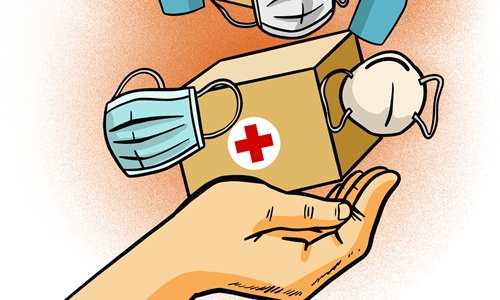HOME >> SOURCE
Safety of workers top priority as business restarts
By Wen Sheng Source:Global Times Published: 2020/2/9 22:47:26

Illustration: Luo Xuan/GT
Assuring signs appear to emerge as the numbers of newly infected novel coronavirus pneumonia (NCP) patients and suspected cases have both been dropping from February 7. But now is not the time for the public and the medics fighting on the frontlines to slack.Thanks to China's draconian measures taken to contain the spread of the NCP, daily infections outside Central China's Hubei Province have dropped significantly, with many provinces now reporting single-digit cases. Hubei, the epicenter of the outbreak, is stabilizing too.
However, this is not the time to celebrate yet, and absolutely there is no ground for Beijing to relax its efforts in galvanizing the nation to strictly screen the people on the move and quarantine those with suspected symptoms like a fever. As the NCP has proved to be highly contagious, a single carrier moving via flights, high-speed trains, subways and buses may cause multiple infections.
And, people need to be psychologically ready to accept a steadily climbing fatality rate of NCP patients in the coming days.
Currently, the death rate nationwide stands at roughly 2 percent - which is higher than an ordinary seasonal flu, but lower than SARS. However, the rate will eventually rise, taking in account fewer new infections and more deaths among the critically ill who remain in hospital ICUs on life support.
But the higher fatality rate should not cause panic because new infections are being brought under control. For China's central authorities, a formidable job before them is to prevent a resurgence of NCP in any place outside Hubei.
Starting Monday, a good number of Chinese companies will scoop back to business operations after an extraordinarily protracted holiday was forced by the virus' eruption. But companies need to take the safety of their workers as the top priority.
Precautions should be taken by all the workers, particularly those using public transportation. Shanghai municipal government is setting an example by outlawing people outdoors without wearing face masks. Other cities should follow suit too and in a prompt manner. They must not take any chances.
To minimize the spread of the virus, all city governments could ask or advise their urban office workers to work from home - which is now quite feasible due to ever-faster and ubiquitous internet connections.
The economic security of Chinese businesses is equally important. Many companies are being clobbered by NCP because the virus epidemic has kept many Chinese people indoors for as long as 18 days now, which has literarily clenched their otherwise strong consumption power. Business in catering, retail, tourism and entertainment are bearing the brunt of the headwind.
To lessen these businesses' predicament, the government ought to extend a helping hand by cutting taxes and exempting fees, while the state-owned banks should be asked to increase credit lines to the enterprises. Only when these businesses are well cushioned to stave off the virus crisis and survive, tens of millions of the country's employees could get jobs, and the society will come to its normalcy, while NCP recedes and vanishes.
After the new coronavirus crisis, the country will surely reflect on the mess caused by it and come up with fresh monetary and fiscal stimulus packages to revive the economy. There is no question that its economy will regain its dynamic nature and start humming again.
But, the central government should look into the NCP catastrophe squarely and faithfully. Loopholes in China's medical emergency alert system must be fixed and broken systems - be it on the medical, economic or administrative level - must be repaired or completely rebuilt.
A new mechanism to protect and encourage "whistle-blowers" in all facets of China's economic and social spheres should be instituted and guaranteed by the law. Any levels of China's administrative officialdom must not interrupt whistle-blowing especially in relation to public health emergencies.
China has been buffeted twice in the same place, first in 2003 by the SARS epidemic and now in 2019-2020 by the NCP outbreak. This country must learn from the heavy lessons taught by the two crises and move on.
The author is an editor with the Global Times. bizopinion@globaltimes.com.cn
Posted in: COLUMNISTS